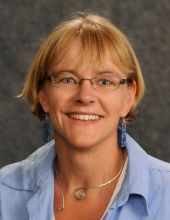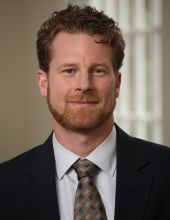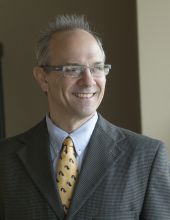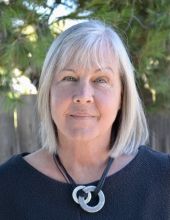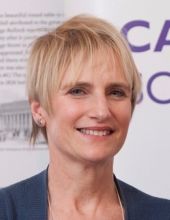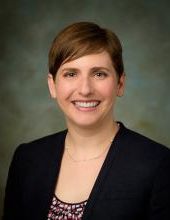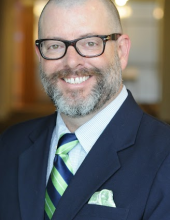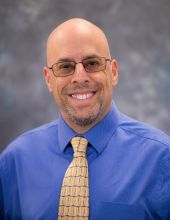Fellows support the OEC by leading its Communities of Practice (CoP). Each community focuses on a specific area of interest, such as ethics education, responsible conduct of research, and ethics in STEM fields. To view our current calls for Fellows, please visit the CoP homepage.
Current Fellows
Julie Simpson
Julie Simpson, Ph.D., is the Director of Research Integrity Services (RIS) at the University of New Hampshire (UNH) and an Affiliate Assistant Professor of College Teaching and of Education. She has worked at UNH for 29 years. Her office administers UNH’s human subjects protections and the Institutional Review Board (IRB), humane care and use of animals and the Institutional Animal Care & Use Committee (IACUC), and responsible conduct of research and scholarly activity (RCR) program and RCR Committee, as well as UNH’s financial conflict of interest in research and HIPAA programs. She is a member of UNH’s IRB, IACUC, RCR Committee, and UNH’s Radiation Safety Committee. She is UNH’s Research Integrity Officer (RIO). She co-developed and co-teaches UNH’s GRAD 930: Ethics in Research and Scholarship, a cross-disciplinary graduate seminar that has been offered since 2005. She was the UNH project director for an Office of Research Integrity (ORI) grant to develop web-based RCR training materials. She is a community member on IRBs at three institutions in New England. Julie has an ongoing research study looking at incoming graduate students’ knowledge of research integrity issues. Julie leads the OEC's Scholars, Educators, and Administrators Fostering Research Integrity community of practice.
Rider Foley
Rider W. Foley is an Associate Professor in the Science, Technology, & Society program in the Department of Engineering and Society at the University of Virginia. He is the principal investigator at University of Virginia on the "4C Project" on Cultivating Cultures of Ethical STEM education with colleagues from Notre Dame, Xavier University, and St. Mary’s College. His research focuses on wicked problems that arise at the intersection of society and technology. Rider holds a Ph.D. in Sustainability from Arizona State University, and a Master's degree in Environmental Management from Harvard University, and a Bachelor’s degree in Environmental Science from University of New Hampshire. Before earning his doctorate, he worked for a decade in consulting and emergency response for Triumvirate Environmental Inc. Rider co-leads the Teaching Ethics to Engineering Students CoP with Laura Grossenbacher.
Laura Grossenbacher
Laura R. Grossenbacher is Director of Undergraduate Program Review and Director of the Technical Communication Program in the College of Engineering at the University of Wisconsin-Madison. She holds a Ph.D. from the University of Texas at Austin and has been teaching courses in engineering communication and engineering ethics for over 20 years. In collaboration with several program directors in Engineering Professional Development, she has taught engineering ethics for continuing education credits to Professional Engineers across the state of Wisconsin since year 2012. She and her colleagues together have taught engineering ethics to over 5000 engineers across Wisconsin. She has taught business ethics for the full-time MBA program in the UW-Madison School of Business, and more recently, she has been teaching the GLE 401 Geological Engineering Ethics course for undergraduates at UW-Madison, as well as the graduate-level elective in Professional Ethics course for Interdisciplinary Professional Programs at UW-Madison. She is a longtime member of the Association for Practical and Professional Ethics (APPE) and the American Society of Engineering Education (ASEE). Laura co-leads the Teaching Ethics to Engineering Students CoP with Rider Foley.
Andrew Brightman
Andrew O. Brightman is Professor of Engineering Practice in the Weldon School of Biomedical Engineering at Purdue University. Professor Brightman initiated his educational research in engineering ethics in 2012 when he assembled a multidisciplinary team from Engineering Education, Materials Science, Electrical and Computer Engineering, Philosophy, and Communication that gained NSF funding to investigate a new pedagogy for training engineering students in ethical reasoning. The team developed and evaluated a hybrid course delivery model (in-class and online pedagogy) that involves a scaffolded, integrated, reflective analysis (SIRA) of historical and recent cases dealing with emerging technologies. This pedagogy is based on Reflexive Principlism (RP), an ethical reasoning framework developed for engineers by Brightman and Philosophy colleague, Jonathan Beever. Professor Brightman also developed and has co-taught, since 2005 with a colleague from the medical device industry, a graduate–level course that uses RP and the SIRA pedagogical approach to analyze ethical issues in the design, development, and deployment of medical technologies. Professor Brightman also serves on the Bioethics and Subjects Advocacy Program (BSAP) of the Indiana Clinical and Translational Sciences Institute run by the Center for Bioethics at the Indiana University School of Medicine. Professor Brightman’s current research investigates the ethical experiences of practicing engineers in the health products industry as well as ethical and responsible conduct of research in Biomedical Engineering faculty labs. At the OEC, he leads the CoP on Biomedical Engineering.
Dena Plemmons
Dena Plemmons, Ph.D., is founding Director of the Research Ethics Education Program at the University of California, Riverside. The focus of her work has concerned such issues as ethics communication and education, differences among disciplinary scientific standards, ethics controversies, research-practice partnerships, and human subjects research, among other topics. She has consistently been funded, as PI and Co-PI, through NIH, NSF, and ORI for her research, which includes curriculum development in research ethics and leadership, and investigations into both common and best practices in areas of scientific practice both nationally and internationally. She is Editor-in-Chief of the Springer-Nature peer reviewed journal Science and Engineering Ethics, Chair-elect of the Board of the Association for Practical and Professional Ethics, and expert consultant with the National Center for Principled Leadership and Research Ethics at the University of Illinois, Urbana Champaign.
Natasha Mauthner
Natasha Mauthner is a Professor of Social Science Philosophy and Method at the Newcastle University Business School and leads the Newcastle University Methods Studio. She received her B.A. in Natural Sciences and Ph.D. in Social and Political Sciences from the University of Cambridge, followed by a postdoctoral fellowship at the Harvard University Graduate School of Education. She has held academic positions at the Universities of Edinburgh and Aberdeen, and is a Fellow of the U.K.’s Academy of Social Sciences. Natasha has been teaching research philosophies, methods, and ethics to social scientists since 2003. Her research explores how feminist philosophies of science open new possibilities for the philosophical foundations, methodological approaches, and ethical practices used in the social sciences. This work underpins her substantive contributions to a range of fields including gender, work, and family; the intersection between technology and society; data sharing and big data; perinatal mental health; feminist epistemology and methodology; qualitative research; and research ethics. She has a particular research interest in the ethical complexities of sharing qualitative data, the challenges they present for the regulation of data sharing, and the potential for developing governance frameworks that support flexible, inclusive, and collaborative approaches in which relevant stakeholders work together to devise context-specific data-sharing practices on a case-by-case basis. Natasha co-leads the OEC’s Data Epistemologies and Interpretive Ethics CoP with Dena Plemmons.
Katie Bode-Lang
Katie Bode-Lang is the Director of Research Education, Quality, and Integrity in the Office for Research Protections at Penn State University. Her team oversees research ethics education for the University, including the Research Integrity & Scholarly Ethics (RISE) program. The team also handles quality assurance and research misconduct. Katie has worked for the office since 2014. Previously, she was the assistant director of a research center in the College of Health and Human Development and taught in the College of Liberal Arts. She has presented at national conferences on her work on research ethics education and on communicating effectively with researchers.
Britt Holbrook
J. Britt Holbrook (Ph.D., philosophy, 2004) is Associate Professor in the Department of Humanities and Social Sciences and Director of the Center for Ethics and Responsible Research at New Jersey Institute of Technology. His research combines topics relevant to contemporary science policy (open science, open access, altmetrics, broader impacts requirements for grants) and of perennial concern (ethics education, peer review, academic freedom, the role of the university in society). Holbrook served on the AAAS Committee on Scientific Freedom and Responsibility from 2012 – 2018, as a member of the European Commission Expert Group on Indicators for Open Science in 2019, and as a founding Fellow of the Online Ethics Center Community of Practice on Engineering and Social Justice beginning in 2022.
Elliot P. Douglas
Dr. Elliot P. Douglas is Professor of Environmental Engineering Sciences and Engineering Education, and Distinguished Teaching Scholar at the University of Florida. His research interests are in engineering problem solving, diversity and inclusion, and social justice for engineering ethics. He is an ASEE Fellow and currently serves on the ASEE Board of Directors as PIC I Chair. Dr. Douglas has served as Associate Editor and Deputy Editor of the Journal of Engineering Education, Chair of the Educational Research & Methods Division of ASEE, and Program Director for Engineering Education at the U.S. National Science Foundation. He received S.B. degrees from MIT in 1988 and a Ph.D. from the University of Massachusetts – Amherst in 1993.

